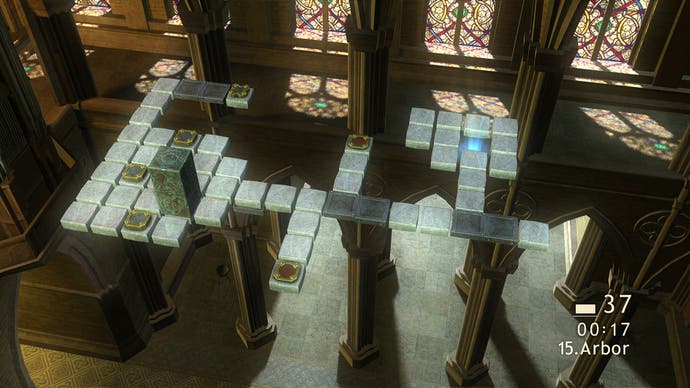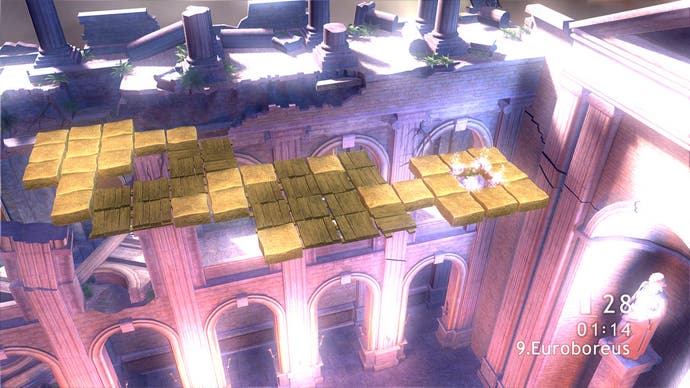Cuboid
Block and roll.
100 years from now, deep in the fiery depths of Hell itself, a meeting will take place between Adolph Hitler, Joseph Stalin, whoever it was that invented the kind of plastic that cheese comes in, and Mikhail Kharlamov, the lead designer of the modest PSN puzzler, Cuboid. Seated around the flaming dinner table, having just finished off a feast composed of Cillit Bang-fried chicken and Vienetta, washed down with a generous serving of Vimto, the man responsible for the Third Reich will turn to Kharlamov in a contemplative manner, and say, "Sure, I've started wars, I've exterminated millions, and I've put fear and murder into the heart of my own people, but tell me: just how did you make the level called 'Flos' so incredibly difficult?"
And the answer? It's very possible that Kharlamov won't be able to say. Cuboid is spatial puzzling at its most austere, a series of brief, microsurgically-precise geometrical challenges which are handled, for the most part, by an area of the human brain that doesn't seem to be wired up to your internal dictionary. When you complete a level, it's often hard to say exactly how you did it; likewise, when you finally pull off a tricky manoeuvre after a half-hour of frustration, it's generally impossible to pin down just what it was that eventually clicked. Your fingers may know, some magical lump of bio-electrical goop inside your skull probably knows, and Cuboid itself certainly knows, but nobody's willing to say much on the subject.
But even if its strategies are hard to explain, Cuboid is ridiculously simple to actually play. Your task is to roll a rectangular block across a series of increasingly intricate tiled mazes, eventually dropping it through a glowing hole at the end of the course. The block is twice as tall as it is wide, which means that you switch between taking up one and two tiles at a time as you role, end over end, around the floor. The mazes aren't always that tough, but actually working your way over to the exit is often the simple part, the real challenge kicking in once you get there and discover that you're lined up incorrectly, falling across the target rather than neatly into it. In these cases, you'll have to back up, perform some bizarre Euclidean variation of parallel parking, and try again. And when, inevitably, you get it all horribly wrong and fall off the edge of the maze, or leave even half your block dangling over empty space, it's game over and back to the beginning of the round.

While it's not the most complex idea, Cuboid's been exhaustively refined to the point where it's immediately addictive: the d-pad controls are nice and clean, the simple presentation means your movements are rarely obscured behind a bit of on-screen furniture, restarts are swift, and the game's levels have been pared down to the nub, with little room for error. And, unusually for such an austere concept, this is also one of the most watchable puzzle games ever made, every staunchly undramatic round likely to fill the sofa with eager spectators, each with their own strategy, none of which they are quite capable of explaining sensibly. That doesn't mean Cuboid's much to look at - the presentation is wondrously naff, a blend of cathedral architecture and new-age mysticism that suggests the game could in fact be a bizarre subconscious recruitment tool for some geometry-fixated cult - but the universal appeal of spatial reasoning has a ferocious power to draw people in, while the likable weightiness of your block, and the gentle wooden click-clocking that ensues as you roll through the maze, brings a lot of character to what is, essentially, a game about the kind of objects you could find at your local Homebase.
As for the ever-increasing complexity, an area which has taken the sheen off many a promising title, Cuboid manages to gently evolve over the course of the game without damaging the central appeal. Crucial to its success is the fact that all of the complications the developers eventually throw across your path are simple to understand, and entirely consistent with the logic laid down in the first few levels: rickety wooden tiles will break if you place the full weight of the block on just one of them, switches trigger trapdoors, and teleporters split your block into two cubes which can then be controlled separately. By combining these simple elements in increasingly sadistic formulations, Cuboid manages to age with grace, providing an ever-expanding challenge, without collapsing into a tangle of disparate features.

While there are just over sixty puzzles in total, broken up into beginner and expert campaigns, and looking like a worryingly likely candidate for nickel-and-diming with DLC, the relatively short lifespan of Cuboid is somewhat extended by a handful of special levels which severely limit how many times you can move, and leaderboards that encourage you to whittle all your playthroughs down to the most elegant solutions.
And despite Flos, which made me want to rip my own face off in frustration, genuine roadblocks are surprisingly rare for a puzzle game with such a brisk learning curve. In fact, if there's a basic problem with Cuboid, it's that the particular brand of spatial thought it requires can occasionally be side-stepped simply by randomly rolling the block around for a few minutes and seeing where that gets you, slicing away all the challenge in a mindless mashing of the controller.
Despite this potential for fudging, Cuboid remains a strange, personable gem within PSN's line-up. It's a slight game, but a fiercely memorable one, and like all the best puzzlers, it flicks its players back and forth between two simple states: moments of rage when a level seems impossible, and that sudden rush of adrenaline when you finally beat it. Like Tetris, play Cuboid for an afternoon, and you can be sure you'll spend the next couple of nights dreaming about it. For a puzzle game, what higher compliment can there be?

